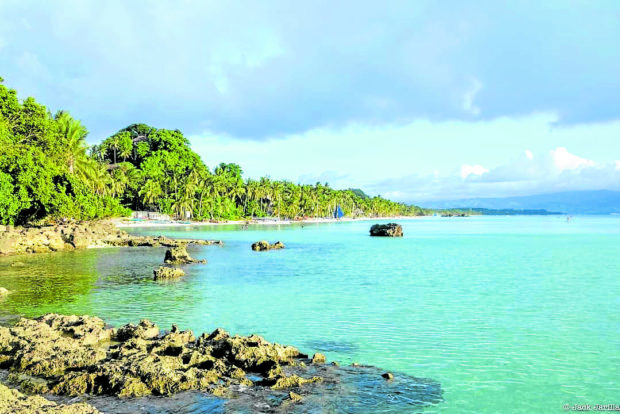
TOURIST MAGNET Even during the coronavirus pandemic, Boracay continues to draw tourists, some of whom resort to faking their COVID-19 test results so they can enter the resort island in Aklan province. —JACK JARILLA
ILOILO CITY, Iloilo, Philippines — The Department of Tourism (DOT) has filed charges against the six tourists who submitted falsified swab test results to get to Boracay Island in January.
The complaints for falsification of public documents were filed in the Aklan Provincial Prosecutor’s Office in Kalibo, the capital of Aklan province, on Feb. 10, said Marc Judicpa of the DOT Boracay field office in a text message on Monday.
“This is how serious the DOT is in the enforcement of existing health and safety rules,” Tourism Secretary Bernadette Romulo-Puyat said in a statement on Monday.
Three of the six tourists from Metro Manila who submitted fake negative results of their reverse transcription polymerase chain reaction (RT-PCR) tests turned out to be infected with the disease in a swab test conducted on Jan. 21 following their arrest in a hotel in Boracay.
Validation
Tourists bound for Boracay are required to submit a negative RT-PCR test result within 72 hours before arriving on the island. They were issued provisional quick response (QR) codes while the test results were being validated.
In December last year, the Aklan police filed criminal complaints against five tourists who also submitted falsified negative RT-PCR test results for violating Republic Act No. 11332, or the Mandatory Reporting of Notifiable Diseases and Health Events of Public Health Concern Act, and for falsification of documents.
Since the island began accepting tourists outside of Western Visayas on Oct. 1 last year, around 100 tourists with falsified RT-PCR tests had been identified. Many were intercepted upon arrival in Malay town on the mainland and before they were able to board their flights in Manila.
The municipality of Malay, which has jurisdiction over Boracay, is set to pass a resolution declaring the 100 tourists with fake RT-PCR test results as “persona non grata,” Councilor Maylynn Aguirre-Graf said.
Graf, who chairs the town council’s committees on tourism, said they were also mulling the passage of an ordinance that would impose a three-year entry ban on those who submitted falsified test results.
In December last year, tourist arrivals on Boracay soared to 15,307, the highest since it resumed accepting tourists. It slightly dropped to 11,898 visitors in January. From Feb. 1 to Feb. 14, visitors reached 7,543, according to data from the Malay Municipal Tourism Office.
Puyat said the DOT welcomed the directive of the Department of the Interior and Local Government (DILG) to the Philippine National Police to arrest and prosecute those found forging their COVID-19 test results.
P1-million fine
The DILG stressed that the violation of RA 11332 carries penalties of P20,000 to P50,000 or imprisonment of one month to six months, or both, at the discretion of the court.
But House Deputy Speaker Wes Gatchalian of Valenzuela wanted a heftier fine for swab test fakers.
On Feb. 8, he filed House Bill No. 8643 that sought to amend RA 11332 by imposing a P1-million fine and imprisonment against those who falsify any kind of COVID-19 test result.
Gatchalian said the faking of any kind of COVID-19 test result “recklessly endangers the lives of the people these offenders may interact or come into contact with.”
“The desire of individuals to proceed with their lives in the new normal should not be at the expense of other people. Falsification per se is not the only issue here, but the corresponding risks it poses for public safety,” he said.
HB 8643, now pending before the House Committee on Health, will also authorize the Professional Regulation Commission to suspend or revoke the license of any medical professional involved in faking test results. Similarly, the Civil Service Commission is also authorized to suspend or revoke the civil service eligibility of government personnel involved in falsifying test results.
—With reports from Tina G. Santos and Julie J. Aurelio